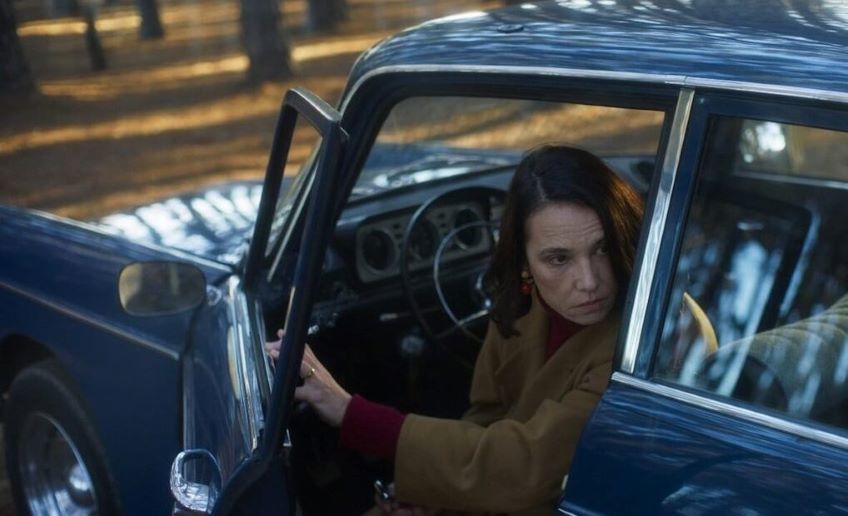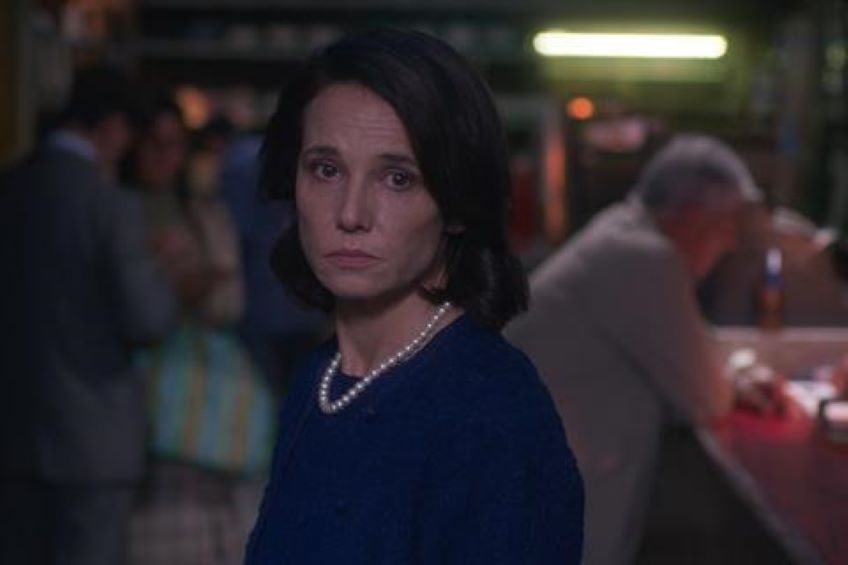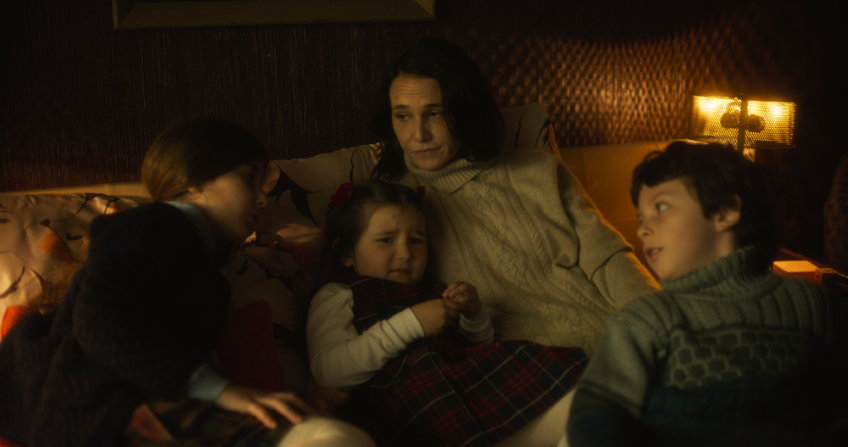Joyce Glasser reviews 1976 (March 24, 2023) Cert 15, 98 mins.
Eighty-one-year-old Patricio Guzman, who has devoted his life to dissecting the trauma of the Pinochet years, is happy to know that filmmakers half his age, like actor (“Machuca”) turned-director Manuela Martelli, are building on his legacy. If Guzman makes incomparable documentaries, Martelli has made a noir thriller with an unusual protagonist. In 1976 an upper-middle-class grandmother from Santiago becomes embroiled in the resistance movement while decorating the holiday home. The story is set in 1976, three years after Guzman, with reels of raw footage that would become “The Battle of Chile”, fled Santiago for Europe.
If you are married to an affable, hard-working surgeon like Miquel (Alejandro Goic, Gloria, No, The Maid) who performs the odd colectomy for Pinochet’s officials; entertains military men like Colonel Rojas; and introduces you to Humberto (Elvis Fuentes) a new neighbour who has found your ID card, you might feel relatively secure at a time when people are being “disappeared” around you.
Yet as the elegantly dressed Carmen (the superb Aline Kuppenheim, “Machuca”) selects a shade of bluish-pink from a Venice travel guide for the beach house, it is hard to ignore the propaganda from the dictatorship busy repairing the “destroyed” and “corrupt” country it inherited. Carmen’s meeting with the decorator is cut short when they hear a woman scream, ‘where are you taking me?’ and then silence. Leaving the building, Carmen uses her foot to examine a ladies’ shoe left behind.

Carmen’s daughter is dropping off her three children at the holiday home that overlooks a rough sea through a large picture window. The village priest’s caretaker Julita (Vilma Verdejo) is making a birthday cake for an upcoming party as Carmen’s housekeeper is not up to it. But Carmen, though a poised, gracious, multi-tasker, seems unsettled. She chain smokes and, as her husband comments in a chauvinistic joke about marrying a doctor but self-medicating, she pops pills stored in her car along with her ID papers. Is this a sign that Carmen is the pulse of the nation: unwell and troubled that the cure is too frightening to face without sedatives?
Carmen is not just a housewife. At the beach house she reads to the blind and donates clothing to the poor through local priest, Father Sánchez (Hugo Medina). This time, Father Sánchez has a more pressing matter. A hungry criminal, who has a record and will be thrown into prison if caught, has been shot in the leg. Carmen protests that she is not a doctor. Her only training was in 1943 when she obtained a Red Cross card. But the hospital would be obliged to notify the police and so Carmen does what she can for 25-year-old Elias (Nicolás Sepúlveda). She cleans up his wounds, but it is obvious that he needs antibiotics.
When she calls Miguel and he proves uncooperative (pressing the matter would arouse suspicion), she makes up a lie at the local hospital, using the line of the ordinary, respectable matron that she later uses with a traffic cop who stops her when she is driving after curfew. Her husband is a doctor in Santiago and couldn’t get time off work, so she is minding the grandchildren at their summer house.
The relationship between Carmen and Elias grows as he gets better, and he admits what Carmen already suspects: that he is no ordinary criminal. He must get away soon because if he is captured and tortured, he will give away Sánchez’s name. He does not know Carmen’s name. They joke about her code name, “Cleopatra.”
And in turn Carmen confides in her patient that she began to train as a doctor, but her parents were against the idea and then she married a doctor – who clearly did not want the competition. Elias is especially handsome when his beard and hair are cut, but nothing as sleazy as a romance has any place in this film.
As Carmen helps Elias prepare for his departure she is drawn into the resistance. Because she is, like us, an “ordinary” person, her involvement is uncannily authentic and grows in tension. Switching buses to make it harder to be followed she ends up in a housing estate where she is approached by a woman named Silvia (Yasna Rios) who mutters a code greeting to prove her identity. Remove your scarf and hide the loaf of bread, Silvia orders. After learning of Elias’s health she frightens Carmen – we later learn this is a check because trained spies would not react.

Just as Carmen’s mundane task of choosing paint becomes mixed with signs of political violence around her, so a day outside with the grandchildren is compromised by the sighting of a woman’s corpse and a police car at the sea wall. The papers are full of the news. Like Carmen, we think of the women it could be.
When the plan for Elias’s escape is compromised, Carmen’s tasks increase, and with them the trail she leaves grows longer. Who amongst the people she encounters will betray her? Is it the bearded man in a slum, the couple in the Sunday boat outing, or the oppressive diver (Germán de Silva, Wild Tales, The Two Popes) in a roadside café where she stops to shake off a car following her? ‘You should leave soon so you don’t break curfew,’ he tells her. Is it sympathetic advice or a warning?
What about the interference on her home phone line? Is it bugged? And after her car is broken into, what about this neighbour, Humberto who has stopped by to return her ID that he found. His face freezes in an ominous close-up as he tells her, ‘Try to be more careful. You may not be as lucky next time.’
1976 introduces something new into the stories of the disappeared, their families and the resistance against Pinochet’s murderous regime: the revulsion of the detached survivor. Martelli’s ending is all the more devastating for returning us to that birthday party Carmen must celebrate, and the delicious cake that is Julita’s legacy.




